A set of 2 cloth bags (red and blue) containing 10 pairs of small wooden geometric solids for matching.
This sensorial Montessori activity’s purpose is visual discrimination but as with all Montessori activities it aims to develop more than just one skill. It is also a tool to learn and increase language, vocabulary and concentration.
The direct aim of this activity was developed by Maria Montessori to refine and develop the stereognostic tactile sense and memory of a child. The indirect aim is language and vocabulary development and also to learn the skill of concentrating.
The child has to learn to recognize and describe the shapes by using their hands, while they are in the bag, without being able to see them. They have to feel them and identify them by touch alone. Doing this task develops the stereognostic sense of touch to create a mental picture of the object in the child’s mind which he is then able to recognize, remember and describe.
When the child is doing the activity, he or she will learn to describe the wooden shaped blocks and ask questions to differentiate them from each other e.g.-why are the shapes different? Are they smooth or do they have angles? Are they square or are they triangular?
By doing this the children will increase their vocabulary and also improve their language skills. Following this, they will learn to use mathematical/geometry terms to name the 3D geometric shapes, cylinder, ovoid, ellipse, sphere and so on.
There are many games that can be played using this activity.
-
One way is to show the child the contents of the bag, name the shapes and then place them back into the bag. The child is invited to close his eyes, put his hand into the bag and find a shape. He has to name the shape without looking at it, before he removes it from the bag. The control of error is visual. If he takes is the shape from the bag and it is not the shape he has named, he will be able to see for himself that it is incorrect. This allows him a sense of control. He can see he is wrong by himself; he doesn’t need someone else to point it out for him. He can return the incorrect shape to the bag and try to find the correct one or he can simply choose another one and try again. He will continue until he has all the shapes on the mat in front of him.
Please use one set of the identical shapes and one bag at this point. You will need 2 sets later, when playing the matching game.
- Another way that is a little more advanced is to ask the child to close his eyes and reach into the bag to find a particular shape. He will feel the different shapes and choose the one that he thinks is the correct one. When he removes it from the bag he will again be able to see for himself whether he is right or wrong.
- Matching game. There are 2 sets of identical wooden shapes. You can put one set into the red bag, and another set into the blue bag. The child is invited to close his eyes, put his hand into the red bag and take out any shape. Then you ask him to find the matching shape inside the blue bag. Display both shapes on a table mat and see if they are identical. If not, continue until the matching shape will be found.
- When your child will learn to use mathematical/geometry terms to name the 3D geometric shapes, you can introduce the "reverse" game, when your child will ask YOU to close your eyes and reach into the bag to find a particular shape.
- To further advance this task, extra items can be added to the bag, different shapes or even different objects. This will be much later on though, only after the child has managed to master different variations successfully.

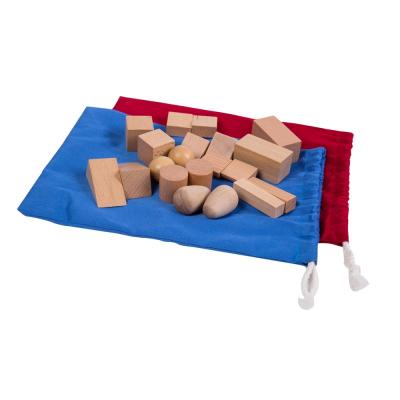
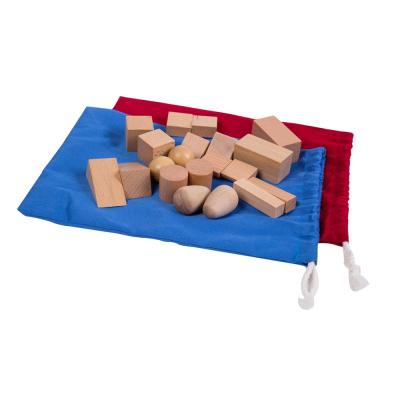
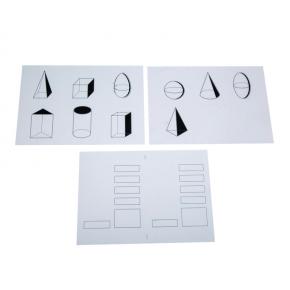
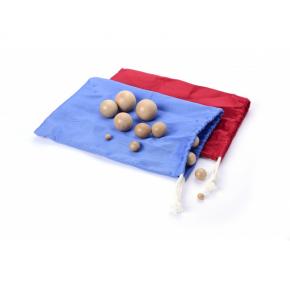
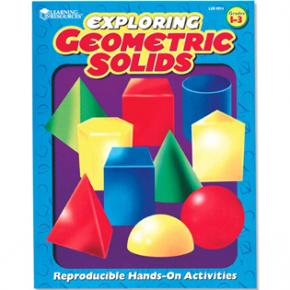

Review from Jennifer DeCelles
The only company I've found that sells a complete set of matching objects. Affordable, excellent quality, and came with a few different colored bags so I am able to switch and renew interest in the activity as needed. Shipping was quick, especially considering it came from another country, and trying to get anything into the US is ridiculous. Extremely satisfied with both my purchase, and the company overall. Will definitely be on my list of go-to companies for classroom supplies.